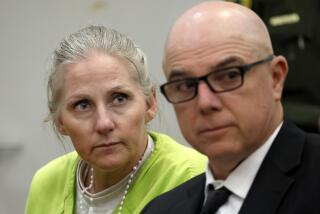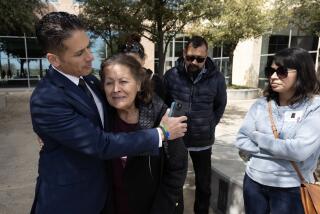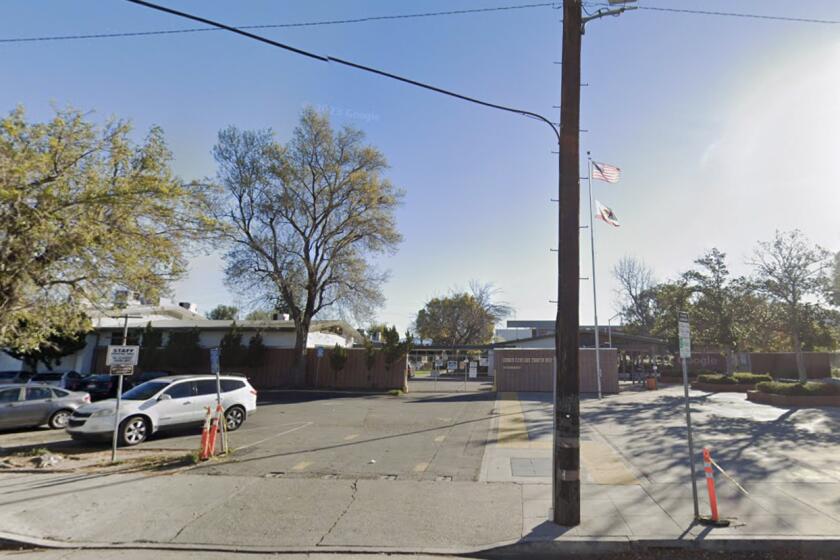Judge orders release of woman who served 11 years behind bars in grandson’s death
A woman who spent 11 years behind bars in connection with the sudden death of her 9-month-old grandson has been freed from prison after new evidence revealed that the death may have been accidental.
Maria Mendez — whose release from custody was made public by her attorneys Wednesday — always maintained her innocence, vowing that she had not hurt her grandson, Emmanuel, before he collapsed and stopped breathing in December 2006.
“Finally, I have my liberty,” said Mendez, 64, who got out of prison last week after a judge vacated her old conviction as part of a larger plea deal. Under the agreement with Los Angeles County prosecutors, Mendez pleaded no contest to voluntary manslaughter, but was released since she had already served the maximum 11-year sentence.
Prosecutors said they stand by medical evidence presented at trial that the death resulted from abuse.
However, medical experts who testified for Mendez during a recent hearing said her case and others highlight increasing doubts about accepted theories of shaken baby syndrome.
Mendez was arrested and charged with murdering her grandson seven months after the baby’s death, court records show. During her trial in 2009, a prosecutor told jurors that Mendez had fallen into a depression after her husband died and became frustrated after her teenage daughter got pregnant with Emmanuel. The prosecutor argued that on Dec. 13, 2006, while babysitting, Mendez snapped and fatally injured the baby.
Prosecutors called Dr. Carol Berkowitz, a pediatrician described to jurors as a child abuse expert. Berkowitz, who saw Emmanuel in the emergency department at Harbor-UCLA Medical Center in 2006, testified that she believed the baby had experienced a traumatic injury one to two hours before paramedics arrived. Mendez, prosecutors argued, was the only adult with the baby during that time.
“In your medical opinion, was the injury to Emmanuel caused by shaking?” the prosecutor asked.
“Yes,” Berkowitz responded. “That would be one mechanism for the injury.”
The prosecutor then asked how violently a baby would need to be shaken to cause brain swelling.
“It would be a significant force,” the doctor said. “One to two short, very forceful jerks would do it.”
After deliberating for three days, jurors deadlocked on the murder charge, but found Mendez guilty of two lesser crimes — assault causing a child’s death and causing a child to suffer unjustifiable pain or injury resulting in death, records show. Soon after a judge sentenced Mendez to 25 years to life in prison, she filed an appeal.
Her appellate attorney, who believed Mendez had been wrongfully convicted, contacted the Project for the Innocent at Loyola Law School, which eventually championed Mendez’s case. The lawyers tracked down medical records, including a CT scan of the brain that Mendez’s trial attorney had not received, said Paula Mitchell, one of Mendez’s attorneys. Several medical experts reviewed the case, Mitchell said, and concluded that the evidence suggested an accidental death.
In a 2016 declaration, Dr. Frank Sheridan, the longtime chief medical examiner for San Bernardino County, wrote that he was the only medical expert who testified on behalf of Mendez at her trial and that her attorney never asked his views on many aspects of the case.
“It is my steadfast belief that Maria Mendez … was wrongfully convicted,” he wrote. “This case has haunted me for years.”
In court documents, another physician who reviewed the case, Roland Auer, wrote that an accidental fall a couple of days before Emmanuel collapsed could have caused cardiac arrest.
“Dr. Berkowitz’s opinion that the child’s head injury was inflicted … rather than accidental is unsupportable by any scientific evidence,” Auer wrote.
During a recent hearing, records show, a doctor with a specialty in pediatric radiology challenged the one- to two-hour trauma window Berkowitz testified about at trial. But in an interview with The Times this week, Berkowitz defended her assessment.
“It still sounds right to me,” the doctor said, adding that she remains confident the baby’s death resulted from abuse.
In his 15-page report on the case, Auer wrote critically of the long-accepted tenets of shaken baby syndrome, saying that impact on a baby’s brain looks the same “whether abusive or not.”
“There is no way of inferring abuse,” Auer wrote, “and the non-science has been called out in recent publications.”
At least 15 people convicted of injuring or killing an infant by violent shaking have since been exonerated, according to a national registry of wrongful convictions. According to another national database, last updated in 2015, at least 3,000 criminal cases related to shaken baby syndrome have been filed in the U.S. over the years.
Last month, in the middle of an evidentiary hearing where medical experts testified about Mendez’s case, Mitchell said prosecutors made her client an offer: They would agree to have her old conviction vacated if she pleaded no contest to two lower charges. To avoid more prison time, Mitchell said, her client agreed, pleading no contest to voluntary manslaughter and child abuse. A judge accepted the plea last month, records show, and ordered Mendez’s immediate release.
The district attorney’s office remains “confident in the validity of the medical opinions and the medical evidence that supported the prosecution of the case,” said district attorney spokeswoman Shiara Davila-Morales. Mendez’s plea, the spokeswoman said, “was effectively an admission that she is not factually innocent.”
Although the new charges lead to the same legal outcome — a conviction — Mitchell emphasized that her client had pleaded “no contest” rather than “guilty” to them.
It was Mendez’s way, Mitchell said, of saying, “I don’t want to fight this anymore.”
During an interview Wednesday, Mendez spoke of settling into her new life in Cozumel, Mexico, with one of her sons. Although she was a legal permanent resident of the U.S. at the time of her arrest, her custody status lapsed while she was behind bars and her attorneys worried that adding an immigration battle to the case would mean more delays.
Her heart breaks at the thought of being separated from much of her family, Mendez said. Eight of her 10 children live in the U.S. and she’s especially worried about her daughter with special needs.
“That’s what really hurts,” she said.
While in prison, Mendez said, she struggled to find motivation — her love for her children, she said, kept her going. When she began to speak about Emmanuel — the little boy who she remembered dancing soon before he collapsed that day — Mendez choked up, saying she wanted to focus on only positive things.
“I’m so happy,” she said, “that I can see the rays of the sun and I can see birds. I can feel a fresh breeze.”
For more news from the Los Angeles County courts, follow me on Twitter: @marisagerber
UPDATES:
3:05 p.m. July 13: This article was updated with a comment from Dr. Berkowitz.
This article was originally published at 9:30 p.m. on July 11.
More to Read
Start your day right
Sign up for Essential California for news, features and recommendations from the L.A. Times and beyond in your inbox six days a week.
You may occasionally receive promotional content from the Los Angeles Times.







